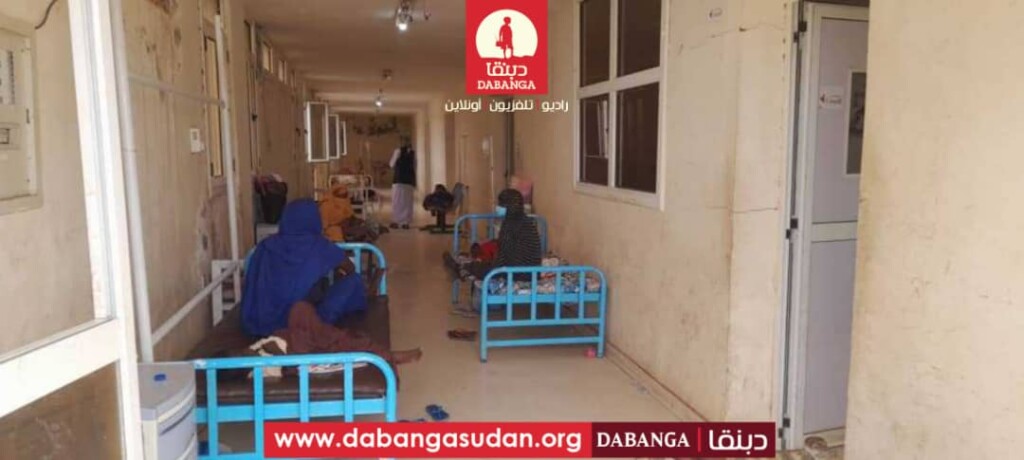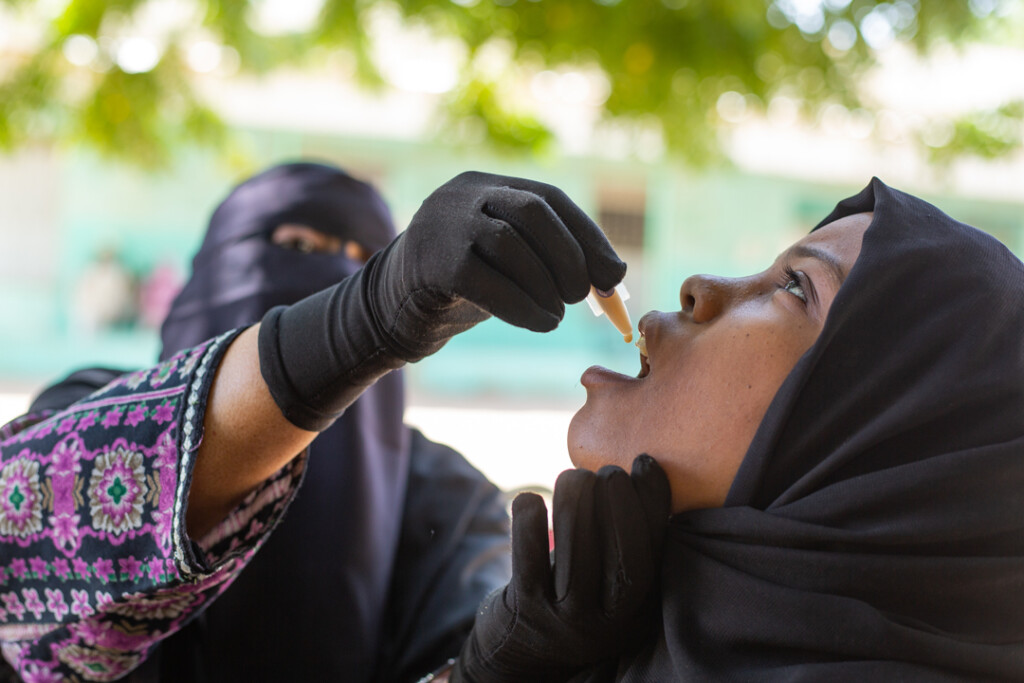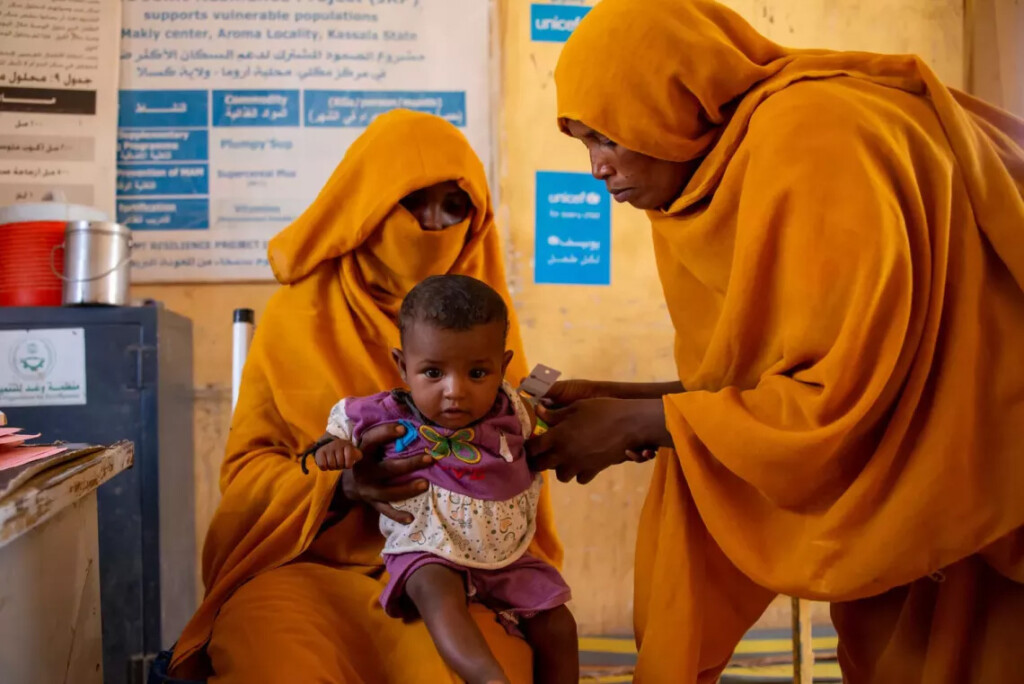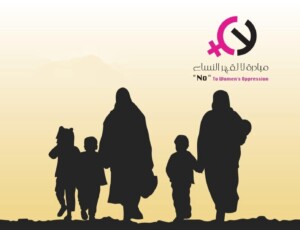War shows another face as Sudanese die of cholera

Cholera patients at Wad El Hilu Rural Hospital in Kassala in July 2024 (File photo: Radio Dabanga)
Prepared by Muhammad Murshid of Jubraka News for Sudan Media Forum
As Sudan’s healthcare system witnesses an almost complete collapse as a result of more than two years of war, cholera is spreading at an accelerated pace, exacerbating the suffering of civilians stricken by the country’s bloody fighting. Tens of thousands of infections and hundreds of deaths have been recorded since late 2024. The cholera outbreak coincides with the lack of clean water, disruption of sanitation services and the collapse of basic health care, prompting international organisations to warn of a large-scale humanitarian catastrophe if urgent measures are not taken.
Official recognition
On August 17, 2024, the former Federal Minister of Health, Haitham Mohamed Ibrahim, officially announced a cholera outbreak in some states of Sudan, attributing this to the deterioration of environmental conditions and pollution of water sources. Since then, cases have continued to fluctuate between expansion and decline in most states.
In the report of the Federal Emergency Operations Centre on Tuesday, July 8, 2025, it confirms that the cases during a week amounted to 603, including eight deaths, bringing the cumulative to 84,531 injuries, including 2,145 deaths, from 110 localities from 17 states, pointing out that the increase in injuries among returnees from South Sudan to Sennar, White Nile and Blue Nile. The report also stated that there is a disparity in the availability of medicines and epidemiology consumables in the warehouses of the State Supply Fund.
These recorded figures reflect the magnitude of the challenges facing health authorities and humanitarian organisations in monitoring and containing the epidemic, especially with the entry of autumn, and the spread of decomposing corpses and waste in the affected areas.
Environmental crisis and fears in Darfur
Adeeba Ibrahim El Sayed, an internal medicine and epidemiologist and member of the Sudanese Doctors Committee – Omdurman Sub-Committee, told Jubraka News that the continuation of the war, the deterioration of the environment, the absence of sanitation services, the spread of decomposing corpses and water pollution are all major factors in the spread of cholera. Famine and malnutrition have also contributed to rapid transmission, overcrowded shelters and shortages of medical staff and supplies, she said.
Adeeba warned of the recent outbreak in the Darfur region, describing the situation there as dangerous due to the difficulty of access to the affected areas as a result of the siege imposed by the Rapid Support Forces, which makes a humanitarian response almost impossible.
She said the available reports were mostly based on Médecins Sans Frontières (MSF) reporting in the city of Nyala, which is under the control of the RSF.
Official government services are almost completely absent in Darfur’s five states, with fighting continuing and hospitals suspended, while the Rapid Support Forces (RSF) are trying to manage the situation amid scarce resources and poor medical response.
In June, the Ministry of Health’s Emergency and Epidemic Control Department in South Darfur reported 279 cases since 27 May, including 21 deaths. Médecins Sans Frontières (MSF) also opened a new cholera treatment centre at Nahda Hospital in Nyala, after 250 cases were recorded at Nyala Teaching Hospital. But the figures remain inaccurate due to security restrictions and difficult access.
Government Inaction and Popular Initiatives
An activist in a local emergency room in Umbada – who asked not to be named – told Jubraka News that the cholera outbreak is directly related to the absence of a government role, stressing that “local authorities, especially the health authority, should have intervened urgently to clean and sterilise the city, as the scene in Umbada lacks a real healthy environment amid corpses and scattered waste.”
He noted that the first wave of the disease had receded in Umbada, but expressed fears of a stronger comeback with rainfall, in the absence of real spraying and cleaning campaigns. He called for concerted efforts between citizens and local authorities, praising neighbourhood cleaning initiatives, including the initiative of the Umbada El Rashidin Committee, which launched a campaign to rebuild and clean neighbourhoods.
He also talked about one of the most dangerous causes of cholera, which is contaminated water, pointing out that one family spends more on safe drinking water than on food, as the price of two jerrycans of water is about SDG 3,000, with difficulty in obtaining it.
It is noteworthy that with the onset of rains, the National Meteorological Centre in Sudan warned in an official publication issued on July 8, of increased rainfall rates and the possibility of sudden flooding, especially in low-lying areas.

(File photo: Ahmed Mohamdeen Elfatih / UNICEF)
The Health Authority recommended the need to prepare early for the risks of waterborne diseases – including cholera – by providing clean drinking water, basic foods and medicines, removing waste and improving public and personal hygiene, and the Authority’s warnings reinforce fears of worsening the health situation, especially if it does not find an urgent response to address the factors of the spread of epidemics.
The Director of the Health Emergency Department at the Federal Ministry of Health, Dr. Montaser Muhammad Othman, told Jubraka News that the insufficient supply of drinking water, especially after the Rapid Support Forces targeted water and electricity stations that disrupted the delivery of services to the population, and the lack of toilets in many areas pushes some to defecate in the open and near water sources, which is one of the most prominent causes of the cholera outbreak. He pointed out that health awareness plays a crucial role in reducing cholera, by informing citizens about the ways of transmission.
He noted that cholera in the history of Sudan has been going through intermittent cycles between the registration of infections for consecutive years extending from four to five years and may be in a state of remission for years extending from three to six years.
During February and March 2025, attacks by the Rapid Support Forces (RSF) on the um Dabakir thermal plant, east of the city of Rabak in White Nile State, led to the interruption of water and electricity services to large parts of the state, prompting people to use alternative unsafe water sources, including that of the White Nile River. This has resulted in an alarming worsening of the cholera situation.

(File photo: UNICEF / Rajab)
Haitham Jumaa, one of those recovering from cholera, in the city of Kosti, told Jubraka News that he began to suffer from vomiting and sudden diarrhoea, and after about an hour his strength collapsed, so his family had to transfer him to the nearest health centre, but the medical staff refused to receive him and directed them to Kosti Teaching Hospital.
Jumaa said that he received with the rest of the other injured during the four days of his stay, treatment, which was limited to pink solutions and taking perfusion salts instead of water, and before that he took antibiotics to stop diarrhoea, explaining that he received 36 continuous intravenous solutions.
He pointed out that in the early days, the isolation centre could accommodate all the injured, but within three days the treatment capacity reached its peak, prompting medical staff to provide ambulance services in the hospital yard and outside, which indicates a worrying escalation of injuries.
Haitham pointed out that most of the deaths he saw during his stay in the isolation centre were people who arrived at the hospital after a delay of long hours, especially from residents of the villages surrounding the city, or from the elderly and people with chronic diseases, and other cases – as he put it – recovered within one to three days after receiving the necessary treatment, which he described as simple despite the seriousness of the disease.
Haitham’s reference highlights the challenges of difficulty in accessing treatment centres, particularly in villages and conflict areas, as it hinders access to health facilities and helps increase mortality rates.
UN ultimatum
In its report released on 3 July 2025, the UN Office for the Coordination of Humanitarian Affairs (OCHA) stated that more than 33.5 million people, including 5.7 million children under the age of five, are at risk due to cholera, with cases increasing in Darfur and reports of transmission to Chad and South Sudan.
Since the outbreak of the war on April 15, 2023, between the army and the Rapid Support Forces, the Sudanese have been suffering complex crises, including displacement and displacement, loss of sources of income, and the spread of epidemics, which made Sudan face what the United Nations describes as the worst humanitarian disaster in the world, requiring urgent intervention locally and internationally to save the remaining lives.

This report is prepared by Muhammad Murshid of Jubraka News, and published via the platforms of Sudan Media Forum, as part of the follow-up to the catastrophic repercussions of the war, including the widespread cholera outbreak in the past months. Alarmingly, this epidemic is latent and is likely to worsen with the start of the rainy season.
#SilenceKills #الصمت_يقتل #NoTimeToWasteForSudan #الوضع_في_السودان_لايحتمل_التأجيل #StandWithSudan #SudanMediaForum











 and then
and then